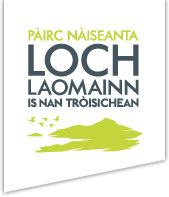
Settlements
The Settlement Names
Aberfoyle: Obar Phuill (oapur FOO-eel) – ‘mouth of the muddy stream’. Obar/Aber is a borrowing from the Brittonic or Pictish language, an equivalent of the more common Gaelic ‘inbhir’
Ardentinny: Àird an t-Sionnaich (aarsd un TCHOONich) – ‘the headland of the fox’
Ardgartan: Àird a’ Ghartain (aarsd uh GHARSTun) – ‘the headland of the corn enclosure’
Ardlui: Àird Laoigh (aarsd LOEU-ee) – ‘height of the calf’ (possibly deer calf)
Arrochar: An t-Àrar (un TAARar) – meaning uncertain, possibly a unit of arable land
Balloch: Am Bealach (um BYALuch) – ‘the pass’
Balmaha: Generally given as Baile Mo Thatha (baluh moa HAA-uh) ‘the settlement of Mo Thatha’, a Celtic saint. However, recent scholarship has suggested Bealach Mo Cha (byaluch moa CHA) ‘the pass of Mo Cha’, referring to St Kentigerna
Balquhidder: Both Phuidir (boh FOOTyir) or Chuidir (CHOOTyir) – ‘both’ is a hut (from which the English ‘bothy’ is derived) but the meaning of the second part is unclear
Blairmore: Am Blàr Mòr (um blaar MOAR) – ‘the big field’
Breadalbane: Bràghad Albann (brah-u ALapun) – ‘the upper part of Alba or Scotland’
Brig o’ Turk: The name is Scots, ‘the bridge of the Tuirc’, derived from the Gaelic torc ‘ravine’ (through which the Finglas River flows). The modern Gaelic name is Ceann Drochaid (kyown DROCHitch) – ‘bridge end’
Callander: Calasraid (KALusratch) – ‘harbour street’ (the street runs parallel to the river)
Crianlarich: A’ Chrìon Làraich (uh chree-un LAARich) – either ‘the wasted site’ or ‘the aspen site’ (the aspen tree is critheann or ‘quivering one’)
Croftamie: Croit Sheumaidh (crotch HAYmee) – ‘Jamie’s croft’
Drymen: Drumainn (DROOmin) – ‘ridge’
Gartocharn: Gart a’ Chàirn (garst uh CHAARN) – ‘the corn enclosure of the cairn’
Inverbeg: An t-Inbhir Beag (un tchinivur BAYK) – ‘the small river-mouth’
Inverlochlarig: Inbhir Lòch Làraig (inivur LOCH laarik) – ‘river mouth of the dark pass’. Lòch, not to be confused with the noun loch ‘lake’, is an ancient Gaelic adjective meaning ‘dark’ or ‘black’
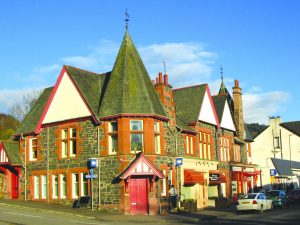 |
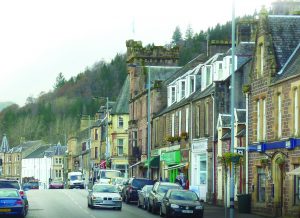 |
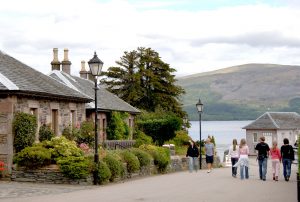 |
| Aberfoyle | Callander | Luss |
Inveruglas: Inbhir Dhùbhghlais (inivur GHOOlish) – ‘mouth of the dark stream’
Killin: Cill Fhinn (kil EEN) – ‘fair church’. A local tradition gives it as the ‘church of Fionn (Fingal)’, the legendary Gaelic hero, as he is reputed to be buried nearby. The Rev. James Stewart of Killin, a native of the Trossachs, was the first translator of the New Testament into Gaelic (1767)
Kilmahog: Cill Mo Chùg (keel moa CHOOK) – ‘the church of St Cùg’
Kilmun: Cill Mhunna (kil VOONuh) – ‘Munna’s church’. Munna was a pet name for St Fintan
Luss: Lus (looss) – from Gleann Luis ‘herb glen’. The Rev. Dr John Stewart of Luss, son of the translator of the New Testament into Gaelic, was the principal translator of the Old Testament into that language (completed 1801)
Port of Menteith: Port na Tèadhaich (porst nuh TCHEH-ich). Menteith is Mon Tèadhaich (mon TCHEH-ich) in Gaelic, referring to the upland between the Lake of Menteith and Loch Venachar. The name is likely to be of Brittonic or Pictish origin and its meaning is obscure
Rowardennan: Rubha Àird Eònain (roo-uh arsd YOANin) – ‘the point of the headland of Adamnan’. St Adamnan (d. 704) was the ninth abbot of Iona and biographer of St Columba
St Fillans: Am Port Mòr (um porst MOAR). The English name recalls the 8th century St Fillan, whereas the Gaelic name means ‘the big port’
Strathyre: The English derives from the Gaelic Srath Eadhair ‘strath of cornland’; however the modern Gaelic form is An t-Iomaire Riabhach (un tchimuruh REEuvuch) ‘the brindled ridge’. Birthplace of the spiritual poet Dugald Buchanan (1716 – 1763), who assisted the Rev. James Stewart of Killin in the translation of the New Testament into Gaelic, and to whom there is a monument in the village
Stronachlachar: Sròn a’ Chlachair (stròn uh CHLACHur) – ‘the stonemason’s point’
Tarbet: An Tairbeart (un TARuburst) –‘the isthmus or place of portage’ (over which ships could be transported from Loch Long). This route was famously used by the Norwegians to harry Loch Lomond before the Battle of Largs in 1263
Tyndrum: Taigh an Droma (tey un DROAMuh) – ‘the house of the ridge’
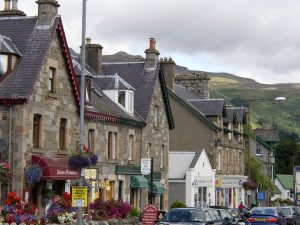 |
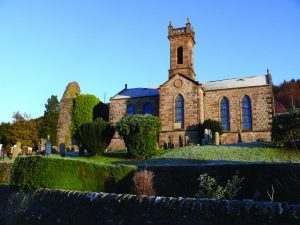 |
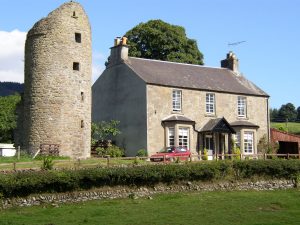 |
| Killin | Kilmun Church | Port of Menteith |

